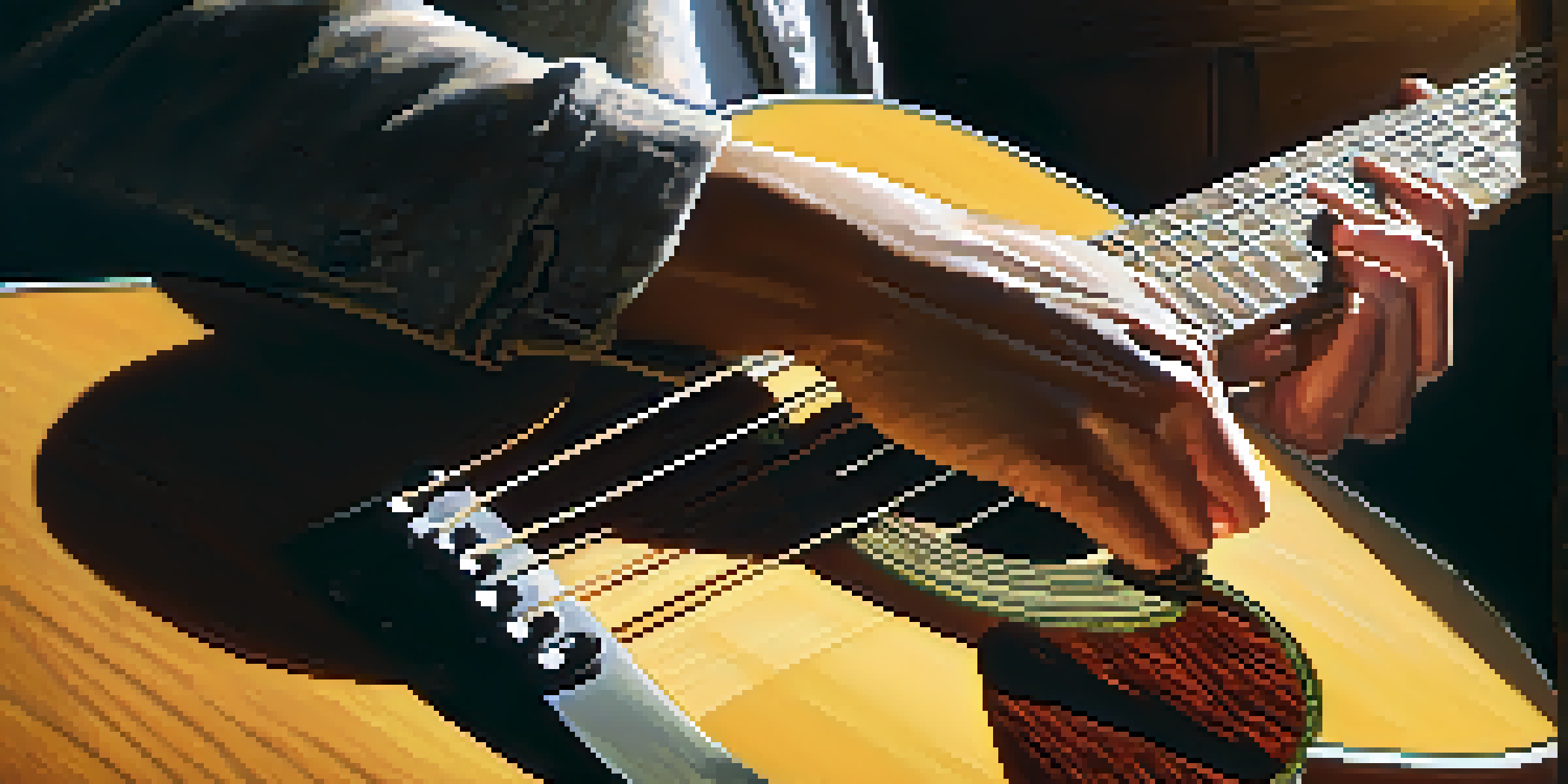Warm-Up Routines to Prepare for Guitar Performance Success

Understanding the Importance of Warm-Ups
Warm-ups are crucial for any musician, especially guitarists. They not only prepare your fingers and hands but also help your mind focus on the music ahead. Think of warm-ups as the stretching exercises athletes do before a big game; they ensure your body is ready for action.
Music is the shorthand of emotion.
By engaging in a proper warm-up, you can reduce the risk of injuries and improve your overall performance. Just like a car needs to warm up before hitting the highway, your fingers need to get in the groove to play smoothly. This preparation allows for better finger dexterity and fluidity.
Additionally, warming up can boost your confidence, making you feel more at ease before stepping onto the stage. When your body is ready, your mind can focus on expressing yourself through your music rather than worrying about hitting the right notes.
Basic Finger Exercises for Warm-Up
Start your warm-up routine with basic finger exercises to get the blood flowing. Simple finger stretches and movements can enhance your dexterity and strength. For instance, try the classic finger stretch: extend your fingers wide and hold for a few seconds before relaxing them.

You can also practice chromatic scales, which involve playing each note in sequence. This exercise not only warms up your fingers but also helps with finger coordination and timing. Imagine each scale as a mini workout for your hands, preparing them for the heavier lifting to come.
Warm-Ups Enhance Performance
Engaging in warm-up exercises prepares both your body and mind, reducing injury risk and boosting confidence.
Incorporating these exercises into your routine will help you develop muscle memory, so when it's time to perform, your fingers will instinctively know where to go. Consistency is key; even just a few minutes a day can lead to noticeable improvements.
Incorporating Scales into Your Routine
One of the most effective ways to warm up is by practicing scales. Scales are the building blocks of music theory, and playing them regularly can help with finger placement and agility. Start with the major and minor scales, which are fundamental for any guitarist.
The only way to do great work is to love what you do.
As you get comfortable, try different patterns or variations, such as playing in thirds or fifths. This variation not only keeps the warm-up interesting but also challenges your fingers in new ways. Think of it like adding different exercises to your fitness routine to keep your muscles engaged.
Remember, the goal is to play these scales slowly and accurately at first. Speed will come naturally with practice, but focusing on precision ensures that your warm-up is effective and beneficial for your performance.
Practicing Chord Changes and Progressions
Another essential part of your warm-up should involve practicing chord changes. Quick transitions between chords are crucial for a seamless performance, so integrating them into your routine is highly beneficial. Start with simple chord progressions and gradually increase the complexity as you warm up.
For example, begin with the classic I-IV-V progression, which is foundational in many songs. By focusing on smooth transitions, you're teaching your fingers to move fluidly across the fretboard, making it easier when you play songs that require quick changes.
Incorporate Scales for Agility
Practicing scales regularly improves finger placement and dexterity, essential for seamless transitions during performances.
Incorporating this practice into your warm-up will not only prepare you technically but also help you emotionally. As you become more comfortable with transitions, you'll gain confidence in your ability to handle the demands of a live performance.
Using a Metronome for Timing and Rhythm
A metronome can be your best friend during warm-ups, as it helps develop your sense of timing and rhythm. Start your exercises with a slow tempo, gradually increasing the speed as you become more comfortable. This practice ensures that you’re not just playing fast, but also accurately.
Imagine a metronome as a ticking clock guiding your musical journey. Keeping steady time is essential for any musician, and by incorporating it into your warm-up, you’ll build a solid foundation for your performance. The ability to stay in time can make a significant difference, especially in group settings.
As you warm up with a metronome, challenge yourself by playing different rhythms or syncopations to further develop your timing skills. This added layer will enhance your overall musicality and prepare you for any performance scenario.
Vocal Warm-Ups for Singers and Guitarists
If you’re a guitarist who sings, don't forget to warm up your voice as well. Vocal warm-ups are just as important as physical warm-ups for your fingers. Simple exercises such as humming scales or lip trills can help loosen your vocal cords and prepare them for singing.
Think of your voice as an instrument that requires care and attention. Just as you wouldn’t jump into a performance without warming up your guitar, your voice deserves the same respect. Incorporating vocal exercises into your routine will ensure that you can hit those high notes with ease.
Mindfulness Boosts Focus
Incorporating mindfulness techniques into your warm-up routine helps clear distractions and enhances your overall performance.
As you warm up both your guitar skills and your voice, you’ll find that they complement each other beautifully. This holistic approach to warm-ups will enhance your overall performance, making you feel more versatile and confident on stage.
Mindfulness and Mental Preparation Techniques
Finally, don’t underestimate the power of mindfulness in your warm-up routine. Taking a few moments to clear your mind and focus on your breathing can set a positive tone for your performance. Visualization techniques, such as picturing yourself successfully executing your songs, can also be incredibly powerful.
Think of this mental preparation as tuning your mind just like you would tune your guitar. It helps eliminate distractions and cultivates a sense of calm before you step into the spotlight. A focused mind can significantly enhance your performance, allowing your musical expression to shine through.

By including mindfulness techniques in your warm-up, you can create a balanced routine that nurtures both your physical skills and your mental readiness. Embracing this holistic approach will lead to a more fulfilling and successful performance experience.